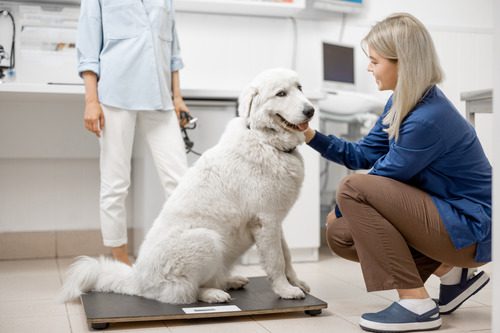Obesity in Pets: Keeping Your Pet Healthy
Obesity in pets is a growing concern that affects many households. It can lead to serious health issues, decreased quality of life, and a shorter lifespan for your beloved companions. At Advanced Animal Care in Fort Mohave, AZ, we understand the importance of maintaining a healthy weight for your pet. This blog will explore the causes, risks, prevention strategies, and management of obesity in pets. For personalized advice, call us at 928-770-4918 or request an appointment today.

What is Obesity in Pets?
Obesity in pets is defined as an excessive accumulation of body fat that poses a health risk. It is often measured by Body Condition Scores (BCS) or comparing the pet’s weight to breed standards. Pets that weigh 10-20% more than their ideal weight are considered overweight, while those over 20% are classified as obese. This condition can affect both dogs and cats and is prevalent across various breeds and ages.
Causes of Obesity in Pets
Several factors contribute to obesity in pets, including:
- Overfeeding: Providing more food than necessary or giving frequent treats can lead to excessive calorie intake.
- Lack of Exercise: Pets that do not engage in regular physical activity are more likely to gain weight.
- Genetics: Certain breeds are predisposed to obesity, such as Labrador Retrievers, Dachshunds, and Beagles.
- Age: Older pets tend to be less active, leading to weight gain.
- Medical Conditions: Hypothyroidism and Cushing’s disease can cause obesity in pets.
- Medication: Some medications may increase appetite or slow down metabolism.
Risks Associated with Obesity in Pets
Health Problems Linked to Obesity
Obesity in pets can lead to numerous health issues, including:
- Diabetes
- Joint Problems
- Heart Disease
- Respiratory Issues
- Decreased Life Expectancy
- Cancer
Preventing Obesity in Pets
- Proper Nutrition: Ensuring a balanced diet is crucial in preventing obesity in pets. This includes several factors. Portion control, which means following feeding guidelines based on your pet’s age, size, and activity level, can help reduce the risk of obesity. Choosing high quality food that meets nutritional requirements without excessive calories is also good practice. Refrain from slipping your pet any table scraps as human food can be high in calories and unhealthy for pets. Be sure to establish a consistent feeding schedule to help regulate your pet’s metabolism as well.
- Exercise and Activity: Regular physical activity is essential for maintaining a healthy weight in pets. Activities can include daily walks tailored to their energy levels, interactive play such as fetch or tug-of-war, training sessions, and toys and puzzles that encourage movement and mental stimulation.
- Monitoring Weight: Regular monitoring of your pet’s weight helps detect early signs of obesity. You can weigh your pet monthly to track weight changes. Consider learning how to assess your pet’s body condition scoring at home, or schedule routine visits to discuss weight management options with your veterinarian.
Managing Obesity in Pets
Veterinary Guidance
If your pet is already overweight or obese, professional guidance is crucial. Your veterinarian can help by conducting health assessments to identify any underlying health issues. Your vet may also create a weight loss plan or offer nutritional counseling. Follow up visits to track your pet’s progress and adjust plans as needed is also necessary.
Diet Adjustments
Managing obesity in pets often involves dietary changes, such as switching to a prescription diet and implementing caloric restriction while ensuring nutritional balance for your pet. Foods high in fiber can also help pets feel full without added calories, as well as using low-calorie alternatives for treats.
Increasing Physical Activity
Enhancing your pet’s exercise routine is essential for weight loss. Try gradually increasing the duration and intensity of activities or mixing different types of exercise to keep your pet engaged. Set specific times for play to ensure consistency. You may also consider hydrotherapy, which are water exercises that reduce stress on joints while promoting weight loss.
Working Together to Combat Obesity in Pets
Obesity in pets is a serious issue that requires attention and proactive management. By understanding the causes, risks, and strategies for prevention and management, you can help ensure your pet stays healthy and happy. If you have concerns about your pet’s weight or need assistance with a weight loss plan, contact Advanced Animal Care in Fort Mohave, AZ, at 928-770-4918 or request an appointment. Together, we can work towards a healthier future for your pet.
